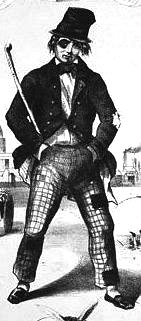Performer/Company Type
Notes
Bert Williams was a blackface performer from Nassau in the Bahamas, who performed across North America in the early 20th century. He performed in a number of successful shows, including In Dahomey (1902). According to the New York Times review for the show, Williams "had electric connections with the risibilities of the audience. He is of a serious, depressed turn of countenance - dull, but possessing the deep wisdom of his kind; slow and grotesquely akward in his movements. He holds a face for minutes at a time, seemingly, and when he alters it, bring[s] a laugh by the least movement. His song of the Jonah man convulsed the audiences with every repeated stanza, until at last his least movement brought forth a roar" ('Dahomey on Broadway'; NYT Feb 19, 1903, p9). He was particularly well-known for singing the song 'Nobody' (1905) from the Broadway show Abyssinia. He often performed alongside George Walker. Jared Glen Toney writes: "As he traversed the stages and cities of the United States and Canada, Bert Williams illustrated some critical themes of the West Indian and black diasporas in early twentieth century North America. His itinerancy maps some incipient transnational networks along which race, ethnicity, and community were being translated, transported, and negotiated among peoples of African descent. These networks became increasingly entrenched in the late 1910s and 1920s, and helped to crystallize the cultural dimensions of blackness through public performance" (Locating Diaspora: Afro-Caribbean Migrations and the Transnational Dialectics of Race and Community in North America, 1910-1929; 2014 UofT dissertation; p206). In his dissertation on diasporic performance, Toney suggests that despite being of West Indian descent, Williams often played to African American stereotypes, which would have been more familiar to the white audiences (p206-208). The New York Dramatic Mirror described him as being "one of the great comedians of the world" (Dec 7, 1918).

